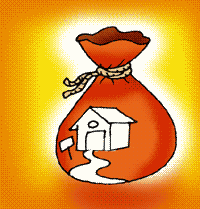 ave a query regarding your home loan? Maybe we can help.
ave a query regarding your home loan? Maybe we can help.
Drop us a line and our expert, Harsh Roongta, will answer it.
Got a question for Harsh Roongta? Please write to us!

I purchased an apartment in February 2005 for which I took a home loan of Rs 14 lakh (Rs 1.4 million).
When can I sell the apartment?
What is the capital gains implication?
- Amit Chopra
You can sell the property any time you desire.
Since you have a loan, it is wise to get a letter from the bank asking for the total amount due.
You can ask the buyer of your apartment to make a cheque directly to your bank of that amount. If he is taking a loan, he can direct his bank or home loan company to make the payment directly.
Of course, if the buyer is also taking a loan from your own bank, the process becomes much simpler.
Alternatively, you could fully repay the loan and take a no-dues certificate from the bank before selling the property.
Also discuss the original documents lying with the home loan company. Your bank will need to certify the original documents that they are holding as security for the loan. They must also state that they will directly release these documents to the buyer or his home loan company within a fixed number of days after receiving full payment.
Capital gains
When you sell any asset you own (house, land, shares, mutual fund units, gold, debentures, bonds) and you make a profit on the sale, it is known as capital gain. The tax you pay on this profit is called the capital gains tax.
If you make a loss (you sell at a lower price than you bought it), you incur a capital loss.
Depending on how long you held the asset, the capital gain is classified either as short-term or long-term.
Short-term capital gain: If you sell the asset within 36 months from the date of purchase (12 months for shares or mutual funds)
Long-term capital gain: If you sell the asset after 36 months from the date of purchase (12 months for shares or mutual funds)
To understand more of this read All you wanted to know about capital gain.
Capital gains is calculated from the date of possession of the property. What you have bought is the right to get an apartment. The right morphs into a house property when possession is given.
Therefore, when you sell the house property the period has to be counted from the date of possession and not from date of registration.
However, if you sell the under-construction property itself (which means you are selling your right to acquire a house property) then the period of three years will be considered from the date of agreement with the builder.
I took a home loan of Rs 2,00,000 from IDBI Bank. Within two years, I made two prepayments: Rs 20,000 and Rs 25,000. Now my total balance is Rs 1,00,000.
I would like to make another prepayment.
However, they have informed me that I cannot make a prepayment of less than Rs 50,000.
Earlier the rule was that I could not make a prepayment of less than 10% of the total loan amount.
Can the rules just be changed like this?
- Amar Chandra Gupta
It is difficult to give a specific answer. It all depends on the terms and conditions of the contract signed by you with the bank. If I make a part prepayment, in addition to the regular Equated Monthly Installments, will it be considered for tax benefit under Section 80C? - Ashish Agrawal Yes. A prepayment is still a payment towards your home loan. Hence it will be included under Section 80C. Let's say that your taxable income is Rs 100,000 and you repaid the home loan principal (including your pre-payment) of Rs 60,000. Your taxable income drops to Rs 40,000 (Rs 100,000 - Rs 60,000). To see what other investments fall under the Rs 1,00,000 exemption limit, read All About Section 80C. Got a question for
Note: Questions may be edited for brevity. Due to the tremendous response, all queries will not be answered.
Disclaimer: While efforts have been made to ensure the accuracy of the information provided in the content, rediff.com or the author shall not be held responsible for any loss caused to any person whatsoever who accesses or uses or is supplied with the content (consisting of articles and information).
Illustration: Dominic Xavier




